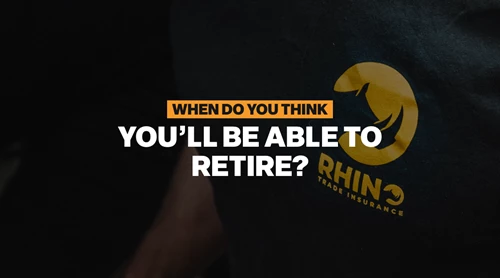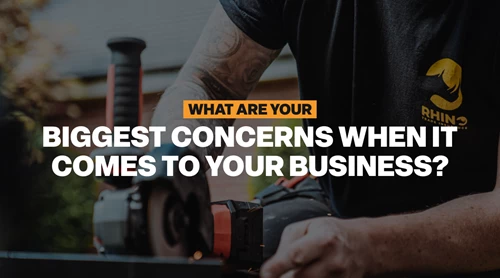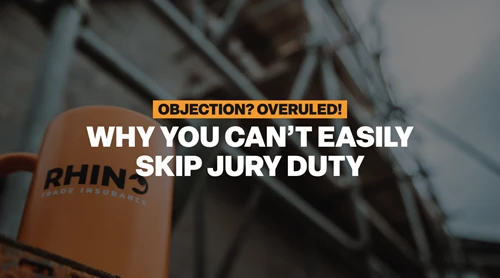Should you buy or lease a van for your trade business? Often your financial situation will decide. But it’s always worth weighing up the factors at play to decide which is the best option for you.
Since a company van is a significant investment, you should do your homework to work out whether buying or renting works best for your particular situation.
The team at Rhino Trade Insurance have explored the advantages and disadvantages of purchasing and leasing a van and we will discuss them in this guide. Grab a brew and read on.
Some quick-fire pros and cons before we get into the details
Pros for buying a van:
- Purchasing outright means there are no monthly payments.
- You aren't tied to when you can upgrade to a newer vehicle.
- You can recover the VAT on your next tax return.
- You aren't limited by the distance you can travel.
Cons for buying a van:
- Buying a van takes up a lot of upfront capital.
- Once you drive it off the forecourt, it decreases in value.
- You are responsible for all upkeep.
Pros for leasing a van:
- Whatever your trade, you can start a business without needing lots of money to buy a work van.
- Depreciation of the vehicle is not your concern because the contract provider assumes any losses if the price drops.
- Depending on your deal, MOTs and other forms of upkeep could be included in your agreement.
- Some lease agreements include perks, which may consist of tax and mileage benefits.
Con for leasing a van:
- A good financial history is required to get a lease.
- Any additional damage will result in a non-negotiable repair charge.
- You'll be charged if you go over the predetermined distance or mileage allowance.
- You must pay a final amount to end your agreement early.
Work vans: buy or lease?
Why buy a van?
It's relatively straightforward: if you purchase a van, you become its owner and are responsible for all maintenance costs. In the long run, the least costly method of owning and running a van is always to buy outright with your own funds.
Of course, only some trade businesses have the means to purchase a van outright, so you may need to think about a financing arrangement as part of the purchase. However, you will still be independent as you won't be restricted by a binding lease agreement. Another positive is you can alter your van's look anytime without having to agree with the leaseholder. You could customise the van's interior to fit your needs or add your company's name and contact information to the outside – it’s up to you.
The negative aspect is that to maintain your van and keep it in the best possible shape, you will have to pay for all necessary repairs, taxes, and insurance yourself. Depreciation should not be overlooked either, as your van will depreciate in value over time.
Looking for insurance for your trade business? Get an affordable quote here.
Why lease a van?
Since the cost of leasing a business vehicle is spread out over a set period of time, you won't need a sizable sum of money to start with. All you will require is a down payment and monthly instalments. Businesses prefer leasing because it allows them to manage fixed costs and provides a quick fix for those without the funds to purchase a vehicle outright.
Like taking out a mobile phone contract, leasing a van commits you to a fixed-term deal that typically lasts between three and five years. Unlike most phone contracts, the van won't be yours at the end of the agreement, and if you decide to buy it, some contracts require you to make a large balloon payment for the van to become yours.
You won't have to worry about maintenance expenses either because the leasing company typically pays for them. There is no risk of unforeseen maintenance costs after the warranty has expired because after the contract expires, you simply return the van and take out a new one. However, you will have to service the van regularly in line with what the leaseholder says.
Mileage restrictions and penalty fees are things to look out for when leasing a van, so keep these in mind and read the terms and conditions thoroughly to avoid being caught off guard.
Can I claim tax back on my van?
The method by which you deduct the cost of purchasing a van from your income tax bill relies on how you pay taxes. You can write off the van as an expense if you follow a typical business accounting process.
There are numerous tax benefits to leasing a van for business, so doing so could be advantageous and help sway your decision. The most important one is that if your company is registered for VAT, you can recover up to 100% of the VAT you paid on the monthly payments so long as your van is only used for work purposes.
Much like purchasing a van, your business can deduct the cost of a van lease when you submit your taxes, as these are considered tax-deductible costs.
How to buy a van as a self-employed tradesperson
As a self-employed tradesperson or business owner, there are certain things to consider before purchasing a new work vehicle.
When buying a van outright, you must consider whether you want to outlay a large chunk of your capital. If these funds are available, it may be a great choice to get the payment over and done with, and then you don't have to worry about any more costs. Some people prefer this method because you can focus your cash flow on other areas of your business without letting the monthly payments hang over you.
A second option could be to obtain a van on credit or finance. If you are set against leasing, you may, over time, like to pay towards fully owning the vehicle. This will incur interest payments; however, you can reclaim all this against your tax.
Should I buy a new or old vehicle?
One thing we still need to mention is the consideration of an electric van. We recently discussed the advantages and disadvantages of buying or leasing one of these vehicles, which you can read all about here. Some interesting pointers include the benefits of going electric due to the need to reduce fuel consumption. Often, leases have mileage offers, so you can effectively drive around without paying for battery recharging.
If you do buy a van, you must choose between new and used. For obvious reasons, older vans are less expensive and can be a wise option for new businesses. If you do your homework, you can find plenty of decent used vans on the market.
On the flip side, purchasing a brand-new van gives you the advantage of owning a brand-new vehicle. This means it should last you a lot longer, and you can showcase your business in the best way possible - remember, marketing your trade business is key and if you’re looking to attract high-value customers, a shiny set of wheels could make a difference.
Why choose Rhino Trade Insurance?
The decision between leasing and buying a trade work van will ultimately be influenced by your finances, the amount of time you plan to use the van, and how involved you want to be in maintaining it. Hopefully, this article has shed some light on what to expect and gave you some food for thought for your next van purchase or lease.
For the hardworking tradesmen and women of the UK, Rhino offer fantastic trade insurance policies to ensure your business is safe and secure should you ever face legal action or be on the hook for compensation.
Why not check out our website or read our informative blog to learn more about our policies? We can tailor all of our insurance options to fit the precise needs of your trade and business. Fancy a quick quote? Get ahead of the game by using our straightforward price engine.




